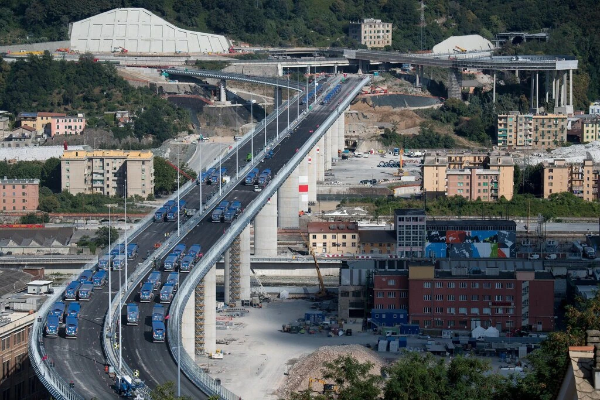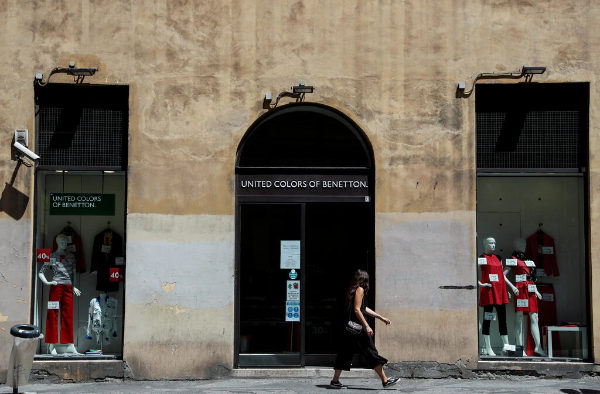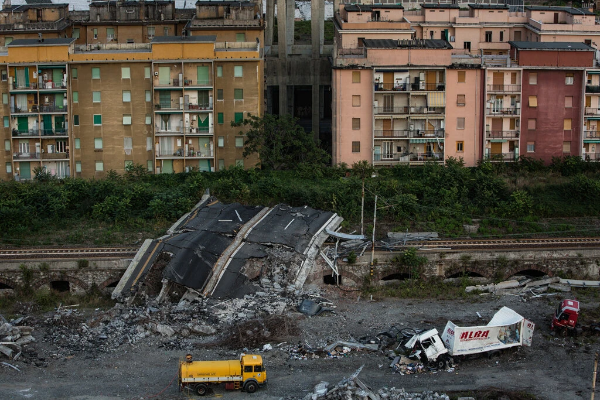ROME — Less than two years after the collapse of the Morandi Bridge in Genoa killed 43 people, Italy will draw a line under the tragedy on Monday wh
ROME — Less than two years after the collapse of the Morandi Bridge in Genoa killed 43 people, Italy will draw a line under the tragedy on Monday when it inaugurates a replacement. But that public celebration has been accompanied by a behind-the-scenes deal that will reshape the running of Italy’s highways as it exacts retribution on the former bridge’s managers.
The Five Star Movement, the populist party that leads Italy’s government, has leveraged the lingering anger over the calamity to engineer the transfer of the controlling share of the company that managed the bridge, Autostrade per l’Italia, or Highways for Italy, from private hands back to those of the state.
The deal for control of Autostrade, which manages more than half of Italy’s 4,000 miles of toll roads and was blamed for failing to keep the bridge safe, has yet to be finalized, but it was meant to specifically punish its majority shareholder, the Benetton family.
For Five Star, the accord is a political triumph, a trophy to exhibit to its dwindling supporters ahead of elections in September in the Liguria region, where Genoa is the capital. But some critics say that the ways Autostrade’s contract was changed by the government has sent a troubling message to potential investors in a country that has long shown itself capricious about business rules.
There was also the question of whether the government was in fact up to running an aging highway and infrastructure system badly in need of investment — one of the reasons its management had been privatized in the first place.
“From the political point of view it’s a masterpiece,” said Alberto Mingardi, the director of the Bruno Leoni Institute, an Italian think tank. “The Five Star can tell their militant voters that they’ve brought home a very prestigious scalp,” he said.
But in terms of rule of law and transparency, the agreement had been a disaster, he said.
“From the point of view of the prime minister it’s a great coup, but many political operations have trodden on rights,” Mr. Mingardi said.
When the middle-of-the-night accord was reached between the government and Autostrade in July, Prime Minister Giuseppe Conte said in a post on Facebook that it affirmed a principle “trampled in the past’’ — ‘‘that public infrastructure is a precious public good that must be managed responsibly and guarantee security and efficient service.”
Five Star and other critics of Autostrade have long contended that the Benettons, originally known for their retail clothing chain, had been given a sweetheart deal when part of the national highway authority was privatized in the 1990s.
The family did not do itself favors or engender public sympathy when it waited two days after the bridge collapse to express its condolences to the victims, through Edizione, the family holding company.
Luigi Di Maio, Italy’s foreign minister and a prominent Five Star leader, used Facebook to vaunt the deal, which would vastly reduce the stake of the Benetton-controlled infrastructure group Atlantia, which controls 88 percent of Autostrade, to allow the government to gain control. The Benettons now own 26.6 percent of Autostrade and their share is expected to drop to around 11 percent.
“The Benettons have accepted the government’s conditions,” Mr. Di Maio said. “This means the Benettons will no longer manage our highways. It was our main goal and we achieved it.”
“After many battles, let me say that it’s an excellent result,” he wrote.
But while Five Star and some others may be pleased by the outcome, the path to the deal and some of its terms have made many uncomfortable.
One of the biggest obstacles to wresting Autostrade from the Benettons was that their original contract stipulated that the government pay them out if the agreement was terminated before its scheduled end in 2038.
That would have required the government to pay Autostrade some 20 billion euros, around $23.6 billion, to go away — a fact that drew considerable outrage in Italy when it came to light in the tragedy’s aftermath.
The Five Star government’s remedy was simply to pass a law in December — without negotiating with the company — that vastly diminished the payout, reducing it to about seven billion euros.
The accord also states that Atlantia, the infrastructure group in which the Benettons are the majority shareholders, will forego any claim or damage in connection with ongoing litigations, including challenging the change in the law.
The government made clear that should Atlantia not live up to its end of the bargain, it was prepared to revoke the license outright.
When Mr. Conte had raised such a possibility ahead of the deal, it spooked the markets, prompting a 15 percent plunge in Atlantia shares.
“The way the whole story was managed, in my view, still leaves some big questions as for any future government intervention on regulated businesses,” Lorenzo Codogno, former chief economist of the Italian treasury and currently of LC Macro Advisors, wrote in a note.
The government “disregarded the risk of undermining the rule of law and producing long-lasting consequences on doing business in Italy.”
The original agreement, posted by the government on its website, also calls for a reduction of tolls, as well as a considerable program of investment and maintenance of the highways.
The government may not have counted on the fact that such factors — along with the company’s debt of more than 9 billion euros, and drastically decreased profitability this year because of the monthslong lockdown and reduced traffic on Italian highways — make Autostrade less appealing to investors, some experts said.
“It’s clear that the Autostrade that the state will own is different from the one when the Benettons were inside,’’ said Giuliano Fonderico, professor of administrative law at Luiss Guido Carli University in Rome.
He added that it wasn’t clear whether the government, through the state-owned lender that will take the majority stake in the company, had the management skills to guide such a complex company. “It’s a legitimate question to ask,” he said.
“There’s this idea that highways are a chicken that lays golden eggs regardless of who manages them, but I think they’ll find that it’s more complex to manage,” Mr. Fonderico said.
Much of Italy’s infrastructure is showing its age, and requires investments that will likely grow over time, said Andrea Colli, a professor of business history at Bocconi University in Milan. “The state is bringing home that problem too,” he said, something investors will be considering when the company goes on the market.
“The government made a political decision, but the market wants profits,” and the two didn’t necessary go together, he said.
“As it is, Italy is widely perceived as unreliable because of its inefficient bureaucracy and slow tribunals, not to mention high taxes and sudden changes in industrial and regulatory policies,” said Marco Sebastiani, an economics professor at Tor Vergata University in Rome.
But the government sent an even more ominous message by issuing laws modifying its contracts with Autostrade, “changing the rules while the game was still being played,” he said.
This month, TCI, the British hedge fund that owns 1 percent of Atlantia with an exposure of 5 percent through equity swaps, filed a complaint to the European Commission accusing Italy of breaching E.U. law when it changed those rules.
“The E.U. has the mandate to protect investors investing in Europe and here, investors lost a lot of money as a result of the unilateral and retroactive actions of the Italian government which are violating E.U. principles,” said Jonathan Amouyal, the TCI fund’s partner who lodged the complaint.
The collapse of the bridge, built in the 1960s, is the subject of a criminal inquiry, and employees of Autostrade as well as officials from the Ministry of Infrastructure and Transport are under investigation.
Prosecutors are also looking into the safety reports compiled by Spea Engineering, a Milan-based company that performed inspections on the bridge. Spea is owned by Atlantia.
Some analysts suggested that the government should have waited until the case went to court and a verdict had been reached before trying to negotiate a change in ownership.
Marco Ponti, a professor of transport economics at Polytechnic University in Milan, said that state control of Autostrade was not necessarily a bad thing, “as long as they don’t abuse their mandate using tolls as a government A.T.M. by bleeding the users.”
In the end, what emerges, said Mr. Mingardi of the Bruno Leoni think tank, is “that in Italy, you do business only if you are a friend of the government, and at that point, it’s better to do business with the government.”
Fonte : www.nytimes.com




